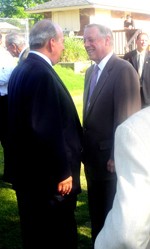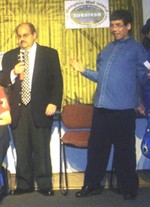One of the axiomatic political races of our time was the
Republican primary race for the open 7th District congressional seat
in 2002. The race featured one well-known Nashville-area candidate, then state
senator Marsha Blackburn of Brentwood, against three – count ’em, 3 –
entries from Shelby County: city councilman Brent Taylor, state senator
Mark Norris, and attorney David Kustoff (now U.S. Attorney for
Tennessee’s Western District).
Each of the three local candidates convinced themselves at
the time that there were enough Shelby County votes to go around, that – as one
of them argued – even if the county’s Republican votes were evenly split three
ways, the leading local candidate would still poll more than Blackburn in the
winner-take-all.
On the basis of this rather serious misunderstanding (it
failed to reckon with Blackburn’s campaigning skill or her statewide reputation
as an income-tax foe), Messrs. Taylor and Norris launched nonstop personal
attacks on each other and on Kustoff, who belatedly, in the last week of the
primary campaign, joined in the mudfest.
At the end of it all, Blackburn, who refrained from any
direct attacks on her opponents, won an absolute majority of the votes,
district-wide, and even finished second, behind Kustoff, in Shelby County, For
better or for worse (that depends on one’s politics, of course), the
conservative Blackburn is a power to be reckoned with in Washington today.
Moral of the story? Muddy hands make for meager votes, at
least in a multi-candidate race where one of the candidates stays free and clear
of the melee.
There is no exact analogy between that campaign and what’s
going on in the GOP primary for the U.S. Senate. But of the three candidates,
two of them – former congressman Ed Bryant, who had vacated that 7th
District seat in 2002 for his first turn at the Senate and former 4th
District congressman Van Hilleary, an unsuccessful gubernatorial
candidate in 2002 – are engaging more or less constantly in personal attacks,
against each other and against the third Republican, former Chattanooga mayor
Bob Corker.
Corker, for his part, is concentrating his fire on
unopposed Democrat Harold Ford Jr.
Most of this warfare, in keeping with the times, is via the
Internet, circulated to media outlets and on various of the email networks which
are virtually teeming in political circles these days. They concentrate on this
or that – ‘my polls are better than their polls,’ ‘I’m the real
conservative; the others are fakers,’ and the like – but of all these
attacks, by far the most remarkable, certainly the most tedious, and maybe the
most counter-productive, come from the Bryant campaign.
These are the email reminders sent out daily under the head
“Bob Corker Fraud Watch, Day ___.” As of Monday, the fill-in-the-blank series
had got up to Day 76, and, as always, the email referenced six former
Chattanooga city employees who in the last year or so have been accused of
various misdeeds, petty and otherwise, and broadly implied, without exactly
saying so or offering any evidence, that Corker might have been looking the
other way.
The accusation seems to derive from charges of alleged past
accounting irregularities made by Corker’s successor as Chattanooga mayor,
Ron Littlefield, who was taken to task back in March by the Chattanooga
Times-Free Press in an editorial deploring “the
more negative trend and tone of events in city government” under Littlefield.
Whatever the facts of the matter, or of the relationship
to them, direct or indirect, of Corker (who has dismissed the allegations and
done his best to ignore them), one fact is undeniable:
Bryant’s “Bob Corker Fraud Watch” emails have varied
only slightly, if at all, from Day One to Day 76. In fact, they seem to be
identical, word for word, day after day after day.
Always subheaded: “…
What did Bob Corker know? When did he know it?
What did he do about it?”
The same email, 76 days in a row and counting.
Lawdy.
Ironically, the mild-mannered
Bryant on the stump comes off almost as vanilla-flavored as Corker — or, for
that matter, Democrat Ford, who no doubt hopes, a la Blackburn in 2002, to be
the beneficiary later on of the ongoing mayhem in Republican ranks. The nearest
thing to a flame-thrower in the Senate race is Hilleary, though even his stump
rhetoric has been just a cut above the intensity of two sticks being rubbed
together by a determined Boy Scout.
But oh, them emails!

Art Imitates
Life-and-Death: Difficult as it is to be in two different places at the same
time, Tennessee governor Phil Bredesen managed to pull off just such a
trick last Thursday night.

Naifeh and Bredesen at Coon Supper
One place where the governor
could be seen, was the Covington Country Club, site of the annual “Coon Supper”
hosted by Jimmy Naifeh, Speaker of the state House of Representatives.
The well-attended event (which serves up a wide variety of hors d-oeuvres and
conventional grilled meats, as well as the featured item) is held toward the end
of each year’s legislative session and, especially during election years, draws
a large crowd of politicians and their attendants, both statewide and local.
(An apparent non-attendee this
year was Rep. Ford, who was criticized in some circles for being at last year’s
event rather than in Washington for a close vote on President Bush‘s
budget.)
The second and simultaneous place for a Bredesen sighting
was at Rhodes College, where a spirited troupe of actors – the
“Rock-‘n-Rollers,” they call themselves – put on another in a series of annual
(sometimes twice annual) dramatic productions.
All of these players are
affiliated with the Center for Independent Living, a non-profit agency which, in
its online self-description, “[p]rovides resource information, personal
and technical support, independent living skills training, peer support and
advocacy to persons with disabilities who want to improve the quality of their
lives. Serves people with all types of disabilities.”

‘Barker’ and ‘Bredesen’ at Rhodes
The “Rock-‘n-Rollers” are indeed
“people with all types of disabilities,” some of them severe, ranging from
post-traumatic to congenital, but they still summon up an astonishing degree of
versatility, skill, and – not least – passion on stage, in the productions that
are written and directed by the troupe’s talented advisor, Mary Claire Giffin.
Two disclosures are in order:
First, my Flyer colleagues Chris amd Charlotte Davis were the original dramatists
and directors for the first several of these productions, roughly a decade ago.
Second, and more to the immediate point, my oldest son, Marcus Baker, is a
“Rock-‘n-Roller,” who this year played TV host Bob Barker in a production
entitled Survivor Memphis: Mud Island.
The play focused on the
difficulties faced by already challenged persons — including several of the
cast members — who were among those purged from the TennCare rolls last year
and now must find other ways of coping with their often prodigious medical and
financial needs.
The plot — based, of course, on
the current TV series Survivor – posited a situation whereby Governor
Bredesen finds himself among a group of disabled “contestants” trying literally
to survive. The play takes several genuinely comic turns, after one of which the
governor finds himself suddenly afflicted with a “fourth world” disease, one
requiring medication available only through TennCare.
Many of the lines, spoken with
gusto by cast members, possess satirical bite and are not at all flattering
toward the governor nor his policy of TennCare cuts. The key statement comes
from a cured and repentant “Bredesen,” who, toward the end, comments, “I guess
I never really thought about it because it never affected me. I did not realize
what it would be like, to, well, know you were going to die because you are not
able to get your medical needs taken care of like you once could.”
Pretty nitty gritty. The fact
is, however, that the TennCare cuts, eliminating many uninsurables, are still in
effect. It should be said that the governor has proposed a revised state
insurance plan, Cover Tennessee, that he suggests would re-incorporate many of
the currently uninsurable under as a high-risk pool plan.
Meanwhile, we can be sure that
the Rock-‘n-Rollers will be there to keep the issue center stage.


